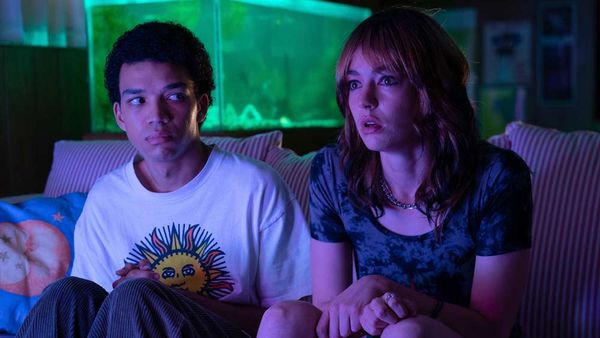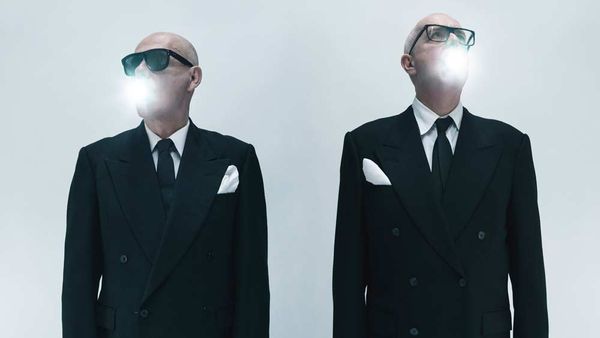April 26, 2011
Eurydice
Kilian Melloy READ TIME: 3 MIN.
How best to understand--and present--Sarah Ruhl's retelling of the myth of Orpheus and Eurydice, which Ruhl tells from the point of view of Orpheus' lost love--hence the title, "Eurydice"?
Ruhl's play is not meant to be taken literally, but it does address serious and wide-ranging themes. Characters pass back and forth between the realms of life and death with relative ease, but even here--in a play that could be described as a contemporary fairy tale--relationships are the hardest tasks of all, and the gaps between individuals--not to mention the gaps between what one wants and the results of one's choices--far overshadow the gap between the living and the dead.
It's both appropriate and inspired that the Independent Drama Society has set their production of the play in a funhouse atmosphere, in which all the underworld really is a stage--or rather, a one-ring circus--populated by shades and stones in the guise of clowns and ruled by a juvenile Lord of the Dead (Adam Lauver).
Orpheus (Greg Nussen) is a world-famous musician. Like any artist, he's consumed by his creative passion. Eurydice (Annie Winneg) seems a little disillusioned with him by the time they marry. Indeed, she skips out of her own wedding reception, a drink in her hand, to stand on the street and ponder her future. That's when a chance meeting--not so chance at all, Ruhl suggests--brings her in contact with a "Nasty Interesting Man," also played by Lauver.
"NIM" has a letter, composed by Eurydice's father (Cliff Blake), a resident in the underworld these days. Though Dad has been dunked in the River Lethe, he's managed to retain his memories of mortal life. Observing his daughter from the realm of Hades, Dad composes a letter for the occasion of her marriage.
it's this letter that NIM possesses, and though Ruhl never quite says it, NIM is clearly meant to be the Lord of the Underworld. He's come above ground--far, far above ground, dwelling as he does at the top of a skyscraper--in order to claim Eurydice as his own. Once he lures the not-so-blushing bride to his penthouse, NIM dispatches her to Hades with a gentle push over the parapet, sending her plummeting to the ground below--and even further, to Hades itself.
Once Eurydice arrives in the underworld, forgetful of her earthly life, her father is there to greet her and guide her back to herself. The idea of Father as ideal man--as the first significant man in a girl's life--is something Ruhl plays with here, not too overtly, but it carries a power that shakes the old myth to its foundations.
Ruhl cleverly, subtly reminds the audience of the primeval religious connection between water and spiritual purity, and hints at something the ancients might have known, namely that the "stain" of sin that affects souls may really be stain, and a wear and tear, of experience. The water of the River Lethe doesn't just "cleanse iniquity," it refreshes the spirit on a deeper level, literally washing away memory and self.
This is all challenging stuff, but Ruhl take things further and asks what might be the most blasphemous of questions: What if Eurydice and Orpheus aren't really the ideal match that tradition has made them out to be? What if, in fact, Eurydice isn't really that into him after all?
Director Lindsay Eagle gets Ruhl so instinctively that her choice to set this modern spin on the myth in a circus, though it may seem strange at the outset, is dead center correct. Fables and fairy tales are not, in their original forms, nice little encomiums designed to entertain the young. They are terrifying stories about mayhem, death, disfigurement, and consequences. We retain few vestiges of those gory trappings, but the exotic, eerie characters presented by the circus--with its wild beasts, its superhuman feats, and its clowns--remains a haven for the dark, bizarre, and extravagant things that still lurk in our collective subconscious. A trio of Stones (Glen Moore, Sarah J. Gazdowicz, and Sierra Kagen) underscores the depth and darkness of those prehensile things: They crave silence and stillness, and if change must come, it's best to let it happen by gradual degree. They embody geological time--as good as all eternity, to the human psyche.
A chorus of stones (Chris Anton, Melissa DeJesus, Zach Eisenstat, Corian Hunt Swartz, Chris Larson, Micah Tougas, and Victoria Townsend) provides all the tumbling chaos of a big top, or an earthquake; Hell is literally in upheaval over this woman, whose mortal husband ventures, armed only with song, to retrieve.
It's a heroic, romantic gesture. But is it necessary, or even welcome? Is the tragedy of loss that a lover is separated from a beloved? Or that there may forever be some doubt as to whether the beloved actually loves him back?
Kilian Melloy serves as EDGE Media Network's Associate Arts Editor and Staff Contributor. His professional memberships include the National Lesbian & Gay Journalists Association, the Boston Online Film Critics Association, The Gay and Lesbian Entertainment Critics Association, and the Boston Theater Critics Association's Elliot Norton Awards Committee.







